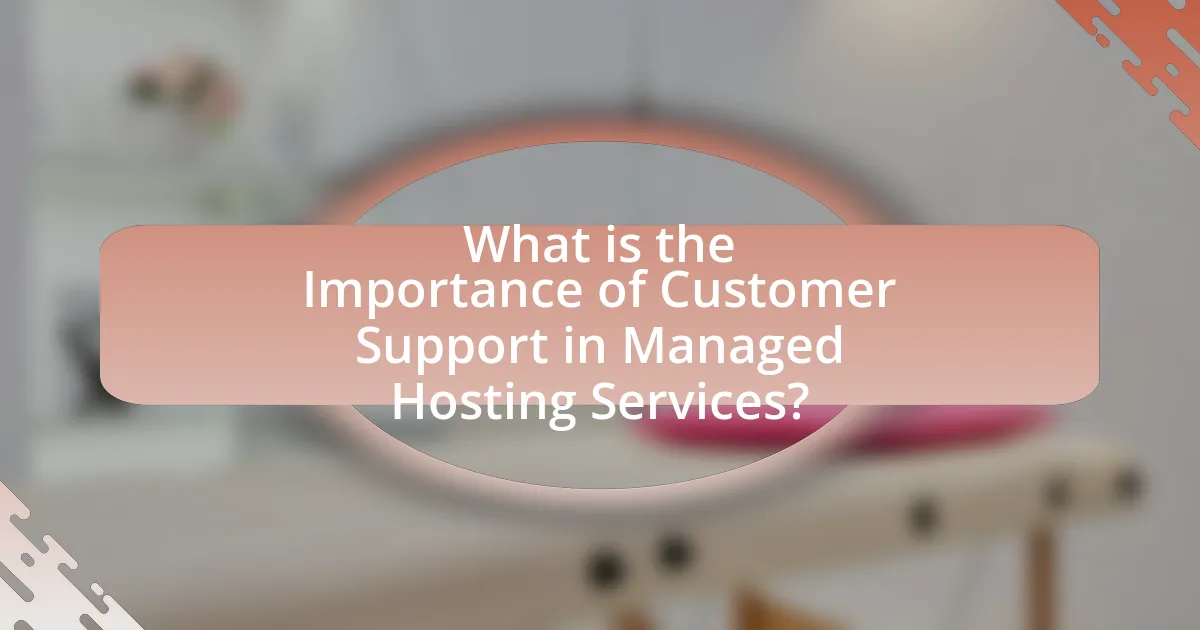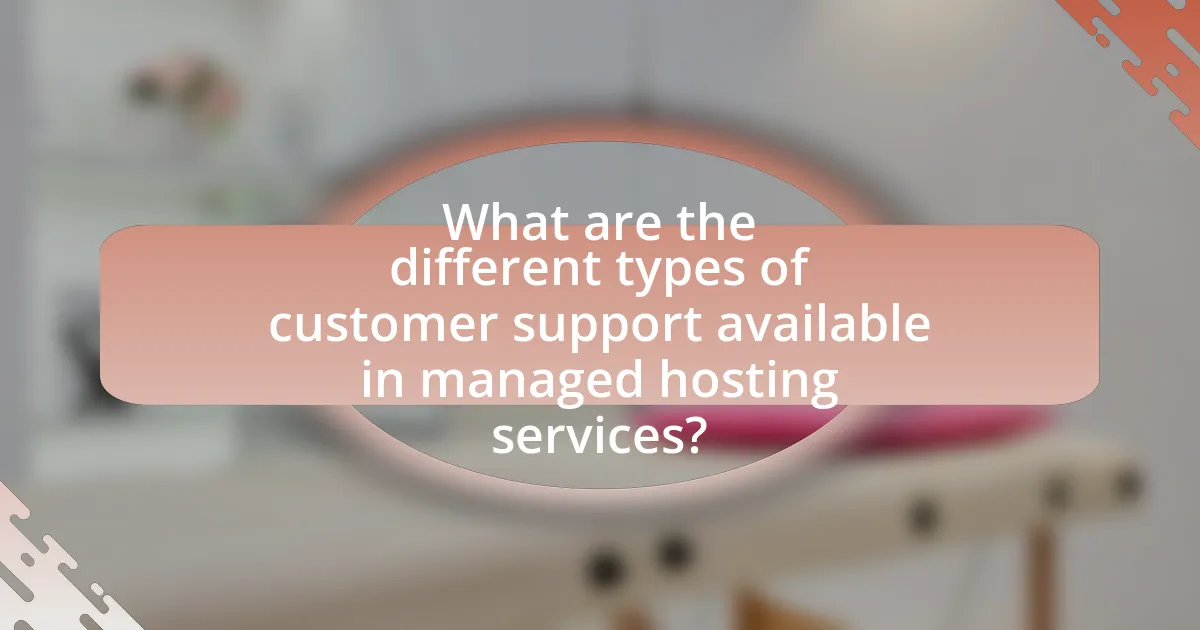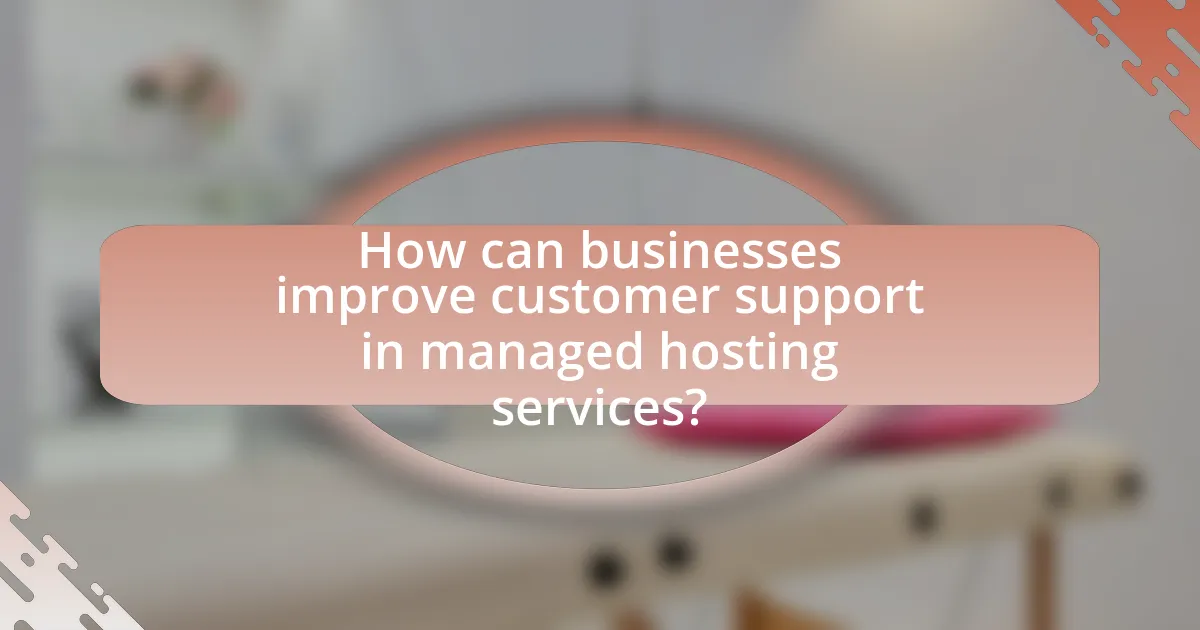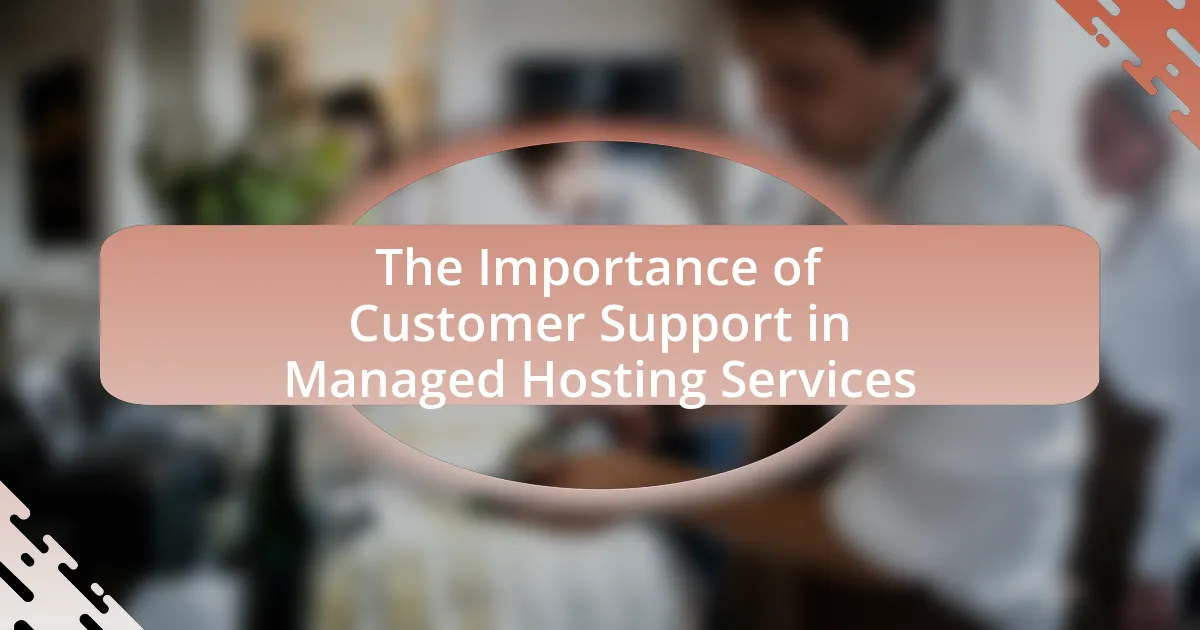Customer support is a critical component of managed hosting services, significantly influencing client satisfaction and operational efficiency. Effective support minimizes downtime by promptly resolving technical issues, fostering trust and loyalty among clients. Key elements of successful customer support include responsiveness, technical expertise, personalized service, and proactive communication. The article explores how customer support impacts overall experience, retention rates, and security in managed hosting, while also examining various support types, best practices, and metrics for measuring effectiveness. Additionally, it addresses common challenges businesses face and offers practical tips for enhancing customer support in this sector.

What is the Importance of Customer Support in Managed Hosting Services?
Customer support is crucial in managed hosting services as it directly impacts client satisfaction and operational efficiency. Effective customer support ensures that technical issues are resolved promptly, minimizing downtime and maintaining business continuity. According to a study by Zendesk, 82% of customers have stopped doing business with a company due to poor customer service, highlighting the necessity of responsive support in retaining clients. Furthermore, managed hosting providers that offer 24/7 customer support can address urgent issues at any time, which is essential for businesses that rely on constant uptime. This level of support fosters trust and loyalty, ultimately contributing to long-term client relationships and business growth.
How does customer support impact the overall experience in managed hosting services?
Customer support significantly enhances the overall experience in managed hosting services by providing timely assistance and resolving issues efficiently. Effective customer support ensures that clients can quickly address technical problems, which minimizes downtime and maintains business continuity. According to a study by Zendesk, 82% of customers have stopped doing business with a company due to poor customer service, highlighting the critical role support plays in client retention. Furthermore, responsive customer support fosters trust and satisfaction, leading to long-term relationships and positive referrals, which are essential for the growth of managed hosting providers.
What are the key elements of effective customer support in this context?
The key elements of effective customer support in managed hosting services include responsiveness, technical expertise, personalized service, and proactive communication. Responsiveness ensures that customer inquiries and issues are addressed promptly, which is critical in a fast-paced digital environment where downtime can lead to significant losses. Technical expertise is essential as customers rely on support teams to resolve complex hosting issues; studies show that 70% of customers prefer to interact with knowledgeable representatives. Personalized service enhances customer satisfaction by making clients feel valued and understood, while proactive communication helps in anticipating customer needs and preventing potential issues before they escalate. These elements collectively contribute to a robust customer support framework that is vital for maintaining client trust and loyalty in managed hosting services.
How does customer support influence customer retention in managed hosting?
Customer support significantly influences customer retention in managed hosting by providing timely assistance and resolving issues effectively. High-quality customer support fosters trust and satisfaction, which are critical for retaining clients in a competitive market. According to a study by Zendesk, 42% of customers are likely to switch to a competitor after a bad customer service experience. This statistic underscores the importance of responsive and knowledgeable support teams in maintaining customer loyalty. Furthermore, effective customer support can lead to increased customer engagement and long-term relationships, as clients feel valued and understood, ultimately enhancing retention rates in managed hosting services.
Why is customer support critical for businesses using managed hosting services?
Customer support is critical for businesses using managed hosting services because it ensures timely resolution of technical issues, which directly impacts operational efficiency. Managed hosting environments often involve complex infrastructures that require expert assistance to maintain uptime and performance. According to a study by Zendesk, 67% of customers have hung up the phone out of frustration after being unable to reach a live representative, highlighting the necessity of accessible support. Furthermore, effective customer support can lead to increased customer satisfaction and retention, as businesses rely on their hosting providers to address challenges swiftly and effectively.
What role does customer support play in troubleshooting and problem resolution?
Customer support plays a critical role in troubleshooting and problem resolution by serving as the primary point of contact for customers experiencing issues. This support team is trained to diagnose problems, provide solutions, and guide customers through technical challenges, ensuring minimal downtime and disruption. According to a study by Zendesk, 67% of customers have hung up the phone out of frustration while waiting for a resolution, highlighting the necessity of effective customer support in addressing issues promptly. By leveraging knowledge bases, ticketing systems, and direct communication, customer support teams can efficiently resolve problems, thereby enhancing customer satisfaction and loyalty in managed hosting services.
How does customer support contribute to the security and reliability of managed hosting services?
Customer support enhances the security and reliability of managed hosting services by providing timely assistance and expertise in addressing technical issues. When customers encounter security threats or system failures, responsive support teams can quickly diagnose problems, implement solutions, and mitigate risks, thereby maintaining service uptime and data integrity. For instance, a study by the Ponemon Institute found that organizations with effective customer support experience 30% fewer security breaches due to prompt incident response. This proactive approach not only resolves immediate concerns but also fosters trust and confidence in the hosting service, reinforcing its overall reliability.

What are the different types of customer support available in managed hosting services?
Managed hosting services typically offer several types of customer support, including 24/7 technical support, live chat assistance, email support, and phone support. These support options ensure that customers can receive help at any time, addressing issues related to server management, security, and performance. For instance, 24/7 technical support allows immediate resolution of critical problems, while live chat provides quick answers for less urgent inquiries. Email support is useful for detailed questions that may require documentation, and phone support offers direct communication for complex issues. This variety of support types enhances customer satisfaction and operational efficiency in managed hosting environments.
How do live chat, email, and phone support differ in managed hosting services?
Live chat, email, and phone support in managed hosting services differ primarily in response time, accessibility, and interaction style. Live chat offers immediate assistance, allowing users to receive real-time responses, which is crucial for urgent issues. Email support, while less immediate, provides a documented communication channel that is useful for complex inquiries requiring detailed explanations. Phone support allows for direct, personal interaction, which can be beneficial for resolving intricate problems quickly through conversation. According to a study by Zendesk, 92% of customers feel satisfied when they can reach support through their preferred channel, highlighting the importance of offering multiple support options in managed hosting services.
What are the advantages and disadvantages of each support type?
The advantages and disadvantages of each support type in managed hosting services include various factors. For example, live chat support offers immediate assistance, enhancing customer satisfaction, but may lack in-depth solutions for complex issues. Email support allows for detailed communication and documentation, yet response times can be slower, potentially frustrating customers. Phone support provides personalized interaction and quick resolutions, but can be resource-intensive and may lead to long wait times. Self-service support, such as FAQs and knowledge bases, empowers customers to find solutions independently, but may not address all inquiries, leaving some customers without help. Each support type has its strengths and weaknesses, impacting overall customer experience in managed hosting services.
How can businesses choose the right type of support for their needs?
Businesses can choose the right type of support for their needs by assessing their specific requirements, such as the complexity of their hosting environment and the level of technical expertise available in-house. For instance, companies with limited technical resources may benefit from 24/7 managed support services that provide comprehensive assistance, while those with more technical staff might opt for tiered support options that allow for self-service and direct access to advanced technical teams. Research indicates that 70% of businesses report improved operational efficiency when they align support services with their specific needs, highlighting the importance of tailored support in managed hosting services.
What is the role of self-service resources in customer support for managed hosting?
Self-service resources play a crucial role in customer support for managed hosting by empowering users to resolve issues independently and efficiently. These resources, such as knowledge bases, FAQs, and community forums, provide immediate access to information, reducing the need for direct interaction with support staff. This not only enhances customer satisfaction by offering quick solutions but also allows support teams to focus on more complex issues, thereby improving overall service efficiency. According to a study by Zendesk, 67% of customers prefer self-service over speaking to a representative, highlighting the effectiveness of self-service resources in meeting customer needs in managed hosting environments.
How do knowledge bases and FAQs enhance customer support?
Knowledge bases and FAQs enhance customer support by providing readily accessible information that empowers customers to resolve issues independently. This self-service capability reduces the volume of inquiries directed to support teams, allowing them to focus on more complex issues. According to a study by Zendesk, 67% of customers prefer self-service over speaking to a representative, indicating that effective knowledge bases and FAQs significantly improve customer satisfaction and efficiency in support operations.
What are the benefits of providing self-service options for customers?
Providing self-service options for customers enhances their experience by increasing accessibility and efficiency. Customers can resolve issues or access information at their convenience, leading to reduced wait times and improved satisfaction. According to a study by Zendesk, 67% of consumers prefer self-service over speaking to a company representative, indicating a strong demand for these options. Additionally, self-service reduces operational costs for businesses, as it minimizes the need for extensive customer support staff, allowing resources to be allocated more effectively.

How can businesses improve customer support in managed hosting services?
Businesses can improve customer support in managed hosting services by implementing 24/7 support availability and utilizing advanced ticketing systems. Providing round-the-clock support ensures that customer inquiries and issues are addressed promptly, which is crucial in the hosting industry where downtime can lead to significant financial losses. Advanced ticketing systems streamline the support process, allowing for efficient tracking and resolution of customer issues, thereby enhancing overall customer satisfaction. According to a study by Zendesk, companies that prioritize customer support see a 10-15% increase in customer retention, highlighting the direct impact of effective support on business success.
What best practices should be followed for effective customer support?
Effective customer support requires clear communication, prompt response times, and a thorough understanding of customer needs. Clear communication ensures that customers feel heard and understood, which builds trust and satisfaction. Prompt response times are critical; studies show that 60% of customers expect a response within an hour, and delays can lead to frustration and loss of business. Understanding customer needs involves actively listening and tailoring solutions to individual situations, which enhances the overall customer experience. Implementing these best practices can significantly improve customer satisfaction and loyalty in managed hosting services.
How can training and development enhance customer support teams?
Training and development enhance customer support teams by equipping them with the necessary skills and knowledge to effectively address customer inquiries and issues. This improvement leads to increased customer satisfaction, as well-trained representatives can provide accurate information and resolve problems more efficiently. Research indicates that organizations investing in employee training see a 24% increase in customer satisfaction scores, demonstrating the direct correlation between training and enhanced service quality. Furthermore, ongoing development fosters a culture of continuous improvement, enabling support teams to adapt to evolving customer needs and technological advancements, ultimately driving better performance and loyalty in managed hosting services.
What technologies can be leveraged to improve customer support efficiency?
Artificial intelligence (AI) and machine learning (ML) can be leveraged to improve customer support efficiency by automating responses and analyzing customer interactions. AI-powered chatbots can handle routine inquiries, reducing wait times and freeing human agents for complex issues. According to a report by Gartner, by 2022, 70% of customer interactions will involve emerging technologies such as AI, which can enhance service speed and accuracy. Additionally, customer relationship management (CRM) systems streamline communication and track customer history, enabling personalized support. A study by Salesforce found that 70% of customers expect personalized interactions, which can be achieved through effective CRM utilization.
What common challenges do businesses face in providing customer support for managed hosting?
Businesses face several common challenges in providing customer support for managed hosting, including technical complexity, resource allocation, and communication barriers. The technical complexity arises from the diverse range of services and technologies involved in managed hosting, requiring support staff to possess specialized knowledge and skills. Resource allocation is often a challenge, as businesses must balance the need for skilled support personnel with budget constraints, which can lead to understaffing during peak times. Communication barriers can also hinder effective support, particularly when dealing with clients who may not have a technical background, making it difficult to convey solutions clearly. These challenges can impact customer satisfaction and retention, emphasizing the need for effective strategies in managed hosting support.
How can businesses overcome these challenges to enhance customer satisfaction?
Businesses can overcome challenges to enhance customer satisfaction by implementing proactive communication strategies and investing in comprehensive training for support staff. Proactive communication, such as regular updates and feedback requests, helps to address customer concerns before they escalate, leading to a more positive experience. Additionally, well-trained support staff equipped with the necessary tools and knowledge can resolve issues efficiently, which is crucial in managed hosting services where downtime can significantly impact customer operations. Research indicates that companies with effective customer support training see a 20% increase in customer satisfaction ratings, demonstrating the direct correlation between staff preparedness and customer experience.
What metrics should be used to measure the effectiveness of customer support?
To measure the effectiveness of customer support, key metrics include Customer Satisfaction Score (CSAT), Net Promoter Score (NPS), First Response Time (FRT), and Average Resolution Time (ART). CSAT quantifies customer satisfaction through surveys, with a typical benchmark being a score above 80%. NPS gauges customer loyalty and likelihood to recommend the service, with scores above 50 considered excellent. FRT measures the time taken to respond to customer inquiries, with industry standards suggesting a response time of under one hour for optimal performance. ART tracks the average time taken to resolve customer issues, with effective support teams aiming for resolutions within 24 hours. These metrics provide a comprehensive view of customer support effectiveness, enabling organizations to identify areas for improvement and enhance overall service quality.
What practical tips can businesses implement to enhance customer support in managed hosting services?
To enhance customer support in managed hosting services, businesses should implement a multi-channel support system that includes live chat, email, and phone support. This approach allows customers to choose their preferred method of communication, increasing satisfaction and response rates. Additionally, providing comprehensive documentation and FAQs can empower customers to resolve common issues independently, reducing the volume of support requests. Regular training for support staff on technical knowledge and customer service skills ensures that they can effectively assist clients. According to a study by Zendesk, 67% of customers prefer self-service options, highlighting the importance of accessible resources. Furthermore, utilizing customer feedback to continuously improve services can lead to better support experiences, as businesses can address specific pain points identified by users.


